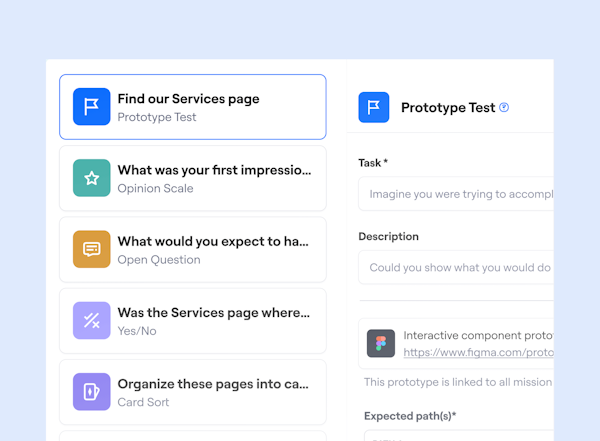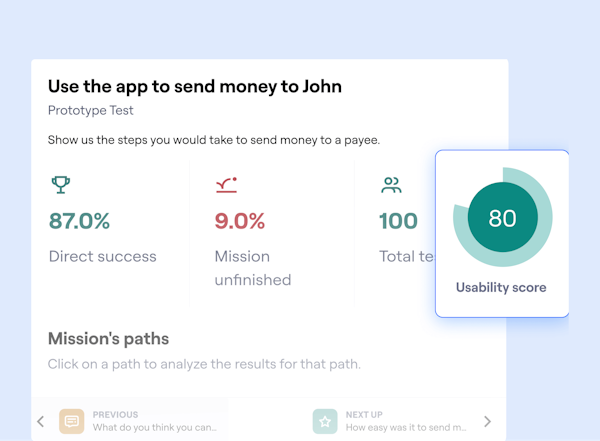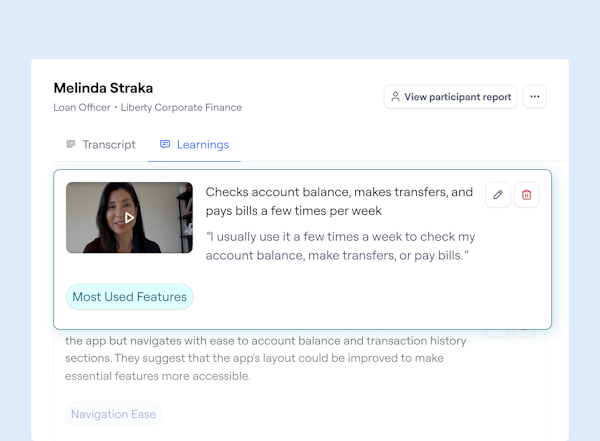Comparing research platforms
Maze vs Sprig
Maze, a Sprig alternative, helps companies build the right products faster by making user insights available at the speed of product development.
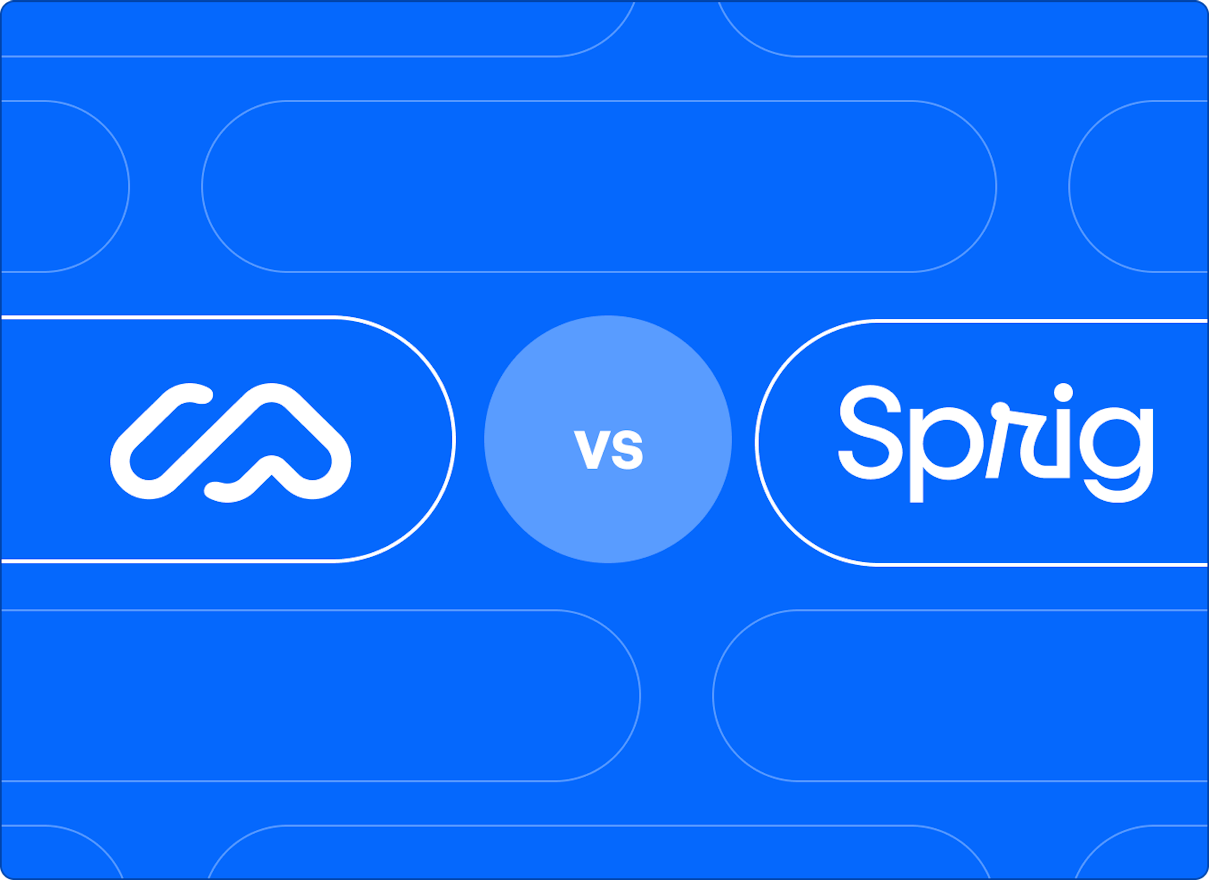
Maze vs Sprig: Introduction
When it comes to research with your users, choosing the right platform can make all the difference to your team. Sprig and Maze are two popular research platforms in the market, but which is the better choice for your organization?
Sprig is a product research platform helping companies capture and analyze user feedback primarily through live intercept testing for real-time insights.
Maze is an AI-first end-to-end platform enabling collection of both qualitative and quantitative insights at an expert-level allowing you to make more confident decisions at the pace of product development. It auto generates reports, analysis and themes allowing you to collect and share insights faster.
In this detailed comparison, we’re covering how both these platforms compare to each other in key points such as:
- User-friendliness - How easy will this platform be to onboard with my team or organization? Will this help democratize our user research?
- Versatility - Is this a true end-to-end platform? Does it facilitate both quantitative and qualitative research methods? How well does this platform integrate with the design tools we use?
- Product decision making - How easily and quickly can we analyze results and customize insight reports to make important decisions?
Platform comparison (from G2 user reviews)
Maze | Sprig | |
|---|---|---|
Overall rating (G2) | 4.5/5 out of 90+ reviews | 4.5/5 out of 40+ reviews |
Ease of use | 9.0 / 10 | 8.8 / 10 |
Ease of setup | 9.6 / 10 | 9.0 / 10 |
Pricing |
|
|
Maze vs Sprig: Main differences
What really sets Maze and Sprig apart for teams doing research?
Breadth of research methods
Sprig has more limited survey question types. Maze offers a more varied range of usability testing options, including card sort, prototype test, tree test, and opinion scale.
Reporting functionalities
Reporting in Maze is far more robust—categorize information in detail to uncover patterns, review and comment insights with stakeholders directly, and embed the visually-rich report in your productivity tools.
Research democratization
Maze is an enterprise-ready, user-friendly platform, enabling every designer, product team, and researcher company-wide to make product decisions based on user insights.
Maze vs Sprig: Feature comparison
Features
Sprig
Maze
Adobe XD, Axure, Figma, Sketch
Figma
Adobe XD, Axure, Figma, Sketch
Google Meet, Microsoft Teams, Zoom
Google Meet, Microsoft Teams, Zoom
Maze vs Sprig: Takeaways
At the end of the day, it comes down to which platform aligns better not only with your budget, but with your workflow and vision as a team.
If you're mostly looking to collect real-time feedback, Sprig provides an easy way to launch microsurveys and collect real-time user feedback in your product.
On the other hand, Maze is an intuitive, cost-effective choice for teams who need a blend of qualitative and quantitative research to inform everyday product decisions. With AI-powered tools for both moderated and unmoderated studies integrated within the same platform, Maze gives product teams a scalable way to uncover user insights at speed and feed them across the entire product development cycle.
![]()
The way Maze operates really speaks to the way user research is done today and matches the way I think about research. Maze lets us use mixed methods in one study. Also, the reporting functionality and AI theming really stand out.
Janet Taylor
Senior Director of Product Design and Research at Homebase
![]()
Using Maze has supercharged our product design process and made it possible to drive faster turnaround times, speeding up product iteration and making for a better, faster user experience.
Yuna Akazawa
Product Designer at Braze
![]()
The way Maze operates really speaks to the way user research is done today and matches the way I think about research. Maze lets us use mixed methods in one study. Also, the reporting functionality and AI theming really stand out.
Janet Taylor
Senior Director of Product Design and Research at Homebase
![]()
Using Maze has supercharged our product design process and made it possible to drive faster turnaround times, speeding up product iteration and making for a better, faster user experience.
Yuna Akazawa
Product Designer at Braze
Why product and design teams choose Maze over Sprig
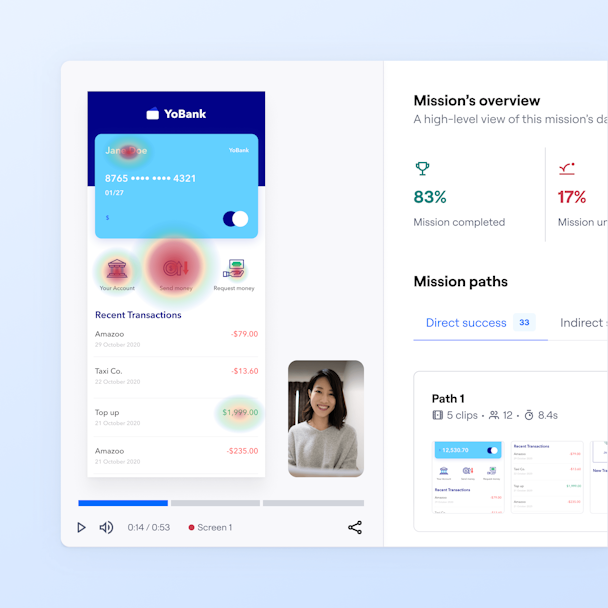
Prototype testing, done right
Integrate with leading design tools and validate usability across your prototypes with real users, from click tracking to multiple user path goals. All before investing valuable resources.
Works with:

Robust, customizable reporting
Maze's reports are automated, visually-rich, and fully customizable. Filter and categorize information in detail to uncover patterns and share valuable insights with stakeholders.
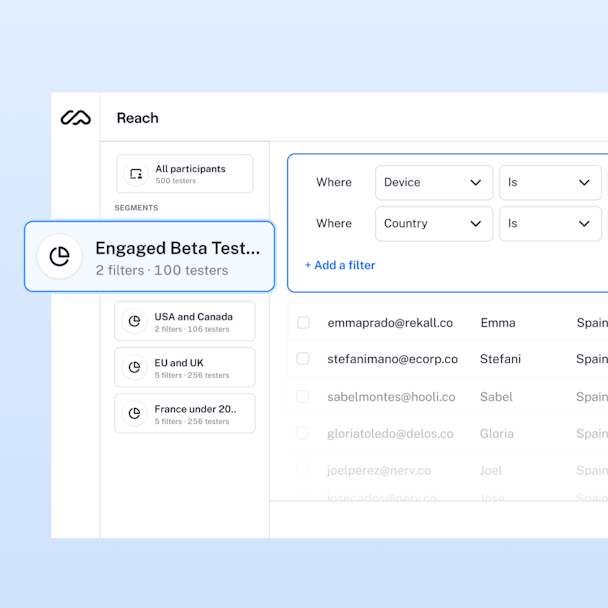
Participant management
Integrated participant management
Pull in people from your own product toolstack, build your own research participant database, and understand your users at a much deeper level. Like a CRM - just for product research.
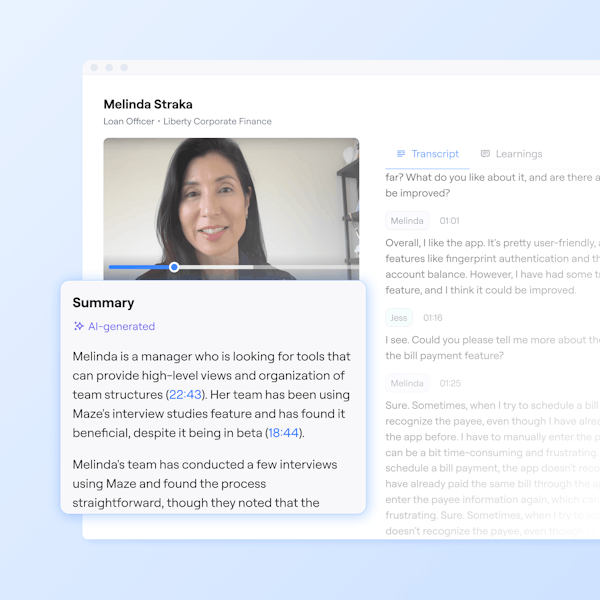
Maze AI
The future of user research
Elevate your company's product research with innovative, AI-powered capabilities that enable you to collect more insights, faster, and with more precision than ever before.
Frequently asked questions
Why choose Maze over Sprig for user research?
Why choose Maze over Sprig for user research?
Product managers, designers, and researchers pick Maze over Sprig for several reasons:
- Maze is more intuitive & user-friendly. It allows for easy rollout and adoption at all levels - even some more complex functionalities like testing design prototypes is more straightforward.
- Maze is a truly all-in-one research platform. It balanced quantitative and qualitative insights better by incorporating quantitative (time on task, completion/abandonment/error/etc rates) and behavioral usability data (clickstreams and heatmaps).
- Maze has a more robust reporting. Maze's reports are automated, visually-rich, and fully customizable. One can filter and categorize information in detail to uncover patterns and share valuable insights with stakeholders.
How can I start using Maze?
How can I start using Maze?
Feel free to signup for a free account at Maze to play around with the platform. If you still have questions about how Maze works or how it can help your organization, get in touch with our product experts.
Who is Maze for?
Who is Maze for?
Anyone working in a product team should be empowered to do research—whether you’re a designer, researcher, product manager, or other.
Maze is used by teams that want to empower everyone to collect actionable user insights to make informed decisions, and share learnings across their whole organization.
What kind of teams use Maze?
What kind of teams use Maze?
Maze is used by product, design and research teams that want actionable user insights to make informed decisions with their users, for their users.
Teams from all sizes and industries use Maze, including Financial Services, Travel, Insurance, Technology/Software, Healthcare, and Retail.
Does Maze use AI?
Does Maze use AI?
Maze has a breadth of AI-powered functionalities designed to elevate your product research and enabling you to collect more insights, faster, and with more precision than ever before.
Can I request a demo?
Can I request a demo?
Absolutely! Tell us a little about your company here and we’ll connect you with someone in our team.

Bring a customer-focused mindset to your organization
Maze gives product teams a scalable way to uncover user insights at speed and feed them across the entire product development cycle.
